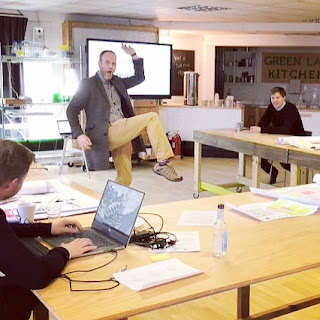As background and context: several years ago, after a surprise ride in an ambulance following my falling over and finding I couldn't stand back up, I was diagnosed with a 'wonky pelvis' - usually, not a problem, but every once in a while, it doesn't 'sit' in my overall skeleton as it should. In turn, that causes everything else to be pulled out of alignment too, which causes issues for the muscles in my back and legs, and in turn also sees my sciatic nerve 'gripe'.
A few weeks ago, I woke up to find that in my sleep I'd managed to rotate my pelvis. Which in turn, meant that my spine had decided to twist itself into more of a snake shape rather than the traditional straight line owing to a kink in it, and my whole upper torso was then twisted as if I'd become a zombie that had fallen down several flights of stairs, but was still compelled to try and chase people in pursuit of their brains...
But despite this being absolutely painful and involving regular trips to the medicine box several times a day, it didn't actually stop me being able to any of the things I'd normally do - it just meant that I had to approach them in (literally) different ways, and that they took longer than usual.
I also know that it's not a forever thing when it happens - thanks to a combination of what appears to be me wresting with myself as I enact physio-prescribed stretches and Pilates/yoga style moves, everything is usually back where it's supposed to be within a few days. But while I'm doing these, I'm also regularly checking to see if I'm able to put my socks on while standing up - my usual dressing routine, which, when my pelvis is 'out', means I have to revert to sitting on the edge of the bed to do.
The reason why I try and put my socks on whilst standing up during times like these isn't because I'm a masochist. It's because I'm trying to figure out which of my usual ways of living and being I might be able to re-adopt (as they were how my body was originally intended to work), and which of my 'work around' practices I should maintain for the foreseeable future (because circumstances have interrupted my usual way of life).
Given how we're all now exiting the pandemic, this 'pelvic episode' of mine seems quite timely: at the start of last year, without apparent warning, we were thrown into turmoil because we suddenly couldn't work or deliver our services and activities in the way that our organisations had always been designed to be.
We found ourselves having to figure out work-arounds and new ways of doing things - all the while whilst also living with pain and discomfort.
But we largely managed this - we kept things mostly going and found ways to live and cope with the upset.
Now: my idea about why my pelvis is so important for businesses, charities, and everyone else right now - just as I found new ways of getting on with a skeleton that was out of kilter, I knew that not all of those new ways of doing things I'd adopted would be good for me in the long run. I needed to regularly check if the things I could before, I was able to do again - because that's how my body was intended to work.
Since the start of this year, I've found myself supporting lots of charities, social enterprises, businesses, and others reflect on how they've been impacted not by the pandemic but how they've been affected by the new working practices they've introduced to be able to continue through it. While many seem to be intending to retain these new practices, I can't help but wonder if it would be useful to occasionally trial some of our pre-pandemic workplace routines and systems - just to check if now is the time that they might be able to be re-introduced, or its still appropriate to continue working in the ways we've come to.
For some, the new practices they've adopted will be vital to their being able to continue, because the pandemic has seen them fundamentally redesign how their organisations work - but for those who were trying to keep going 'on the fly', it may be helpful to take inspiration from my pelvis and see if you're able to get back to 'business as was usual' now, or if you may still need to use the new practices you've figured all to mean things can keep going for a little while longer?
You won't know until you try - and although we've all tired of having been trying different things over the last couple of years, if we don't keep trying new/old things, we'll never know what we might have found or we could yet become/or regained...
(for the sake of decency, and to protect people's eyes, I decided not to include any images of my pelvis, spine, or torso in this blog post)









